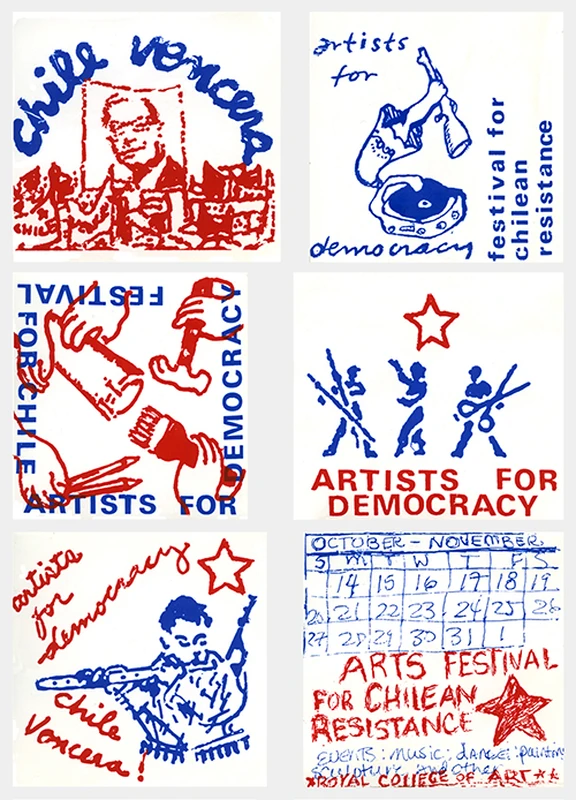Artists for Democracy (1974–1977): Revisited
12 Mar-27 Mar 2024
PV 14 Mar 2024, 5-8pm


This is the second in a series of exhibitions examining the activities of the 1970s artists’ collective organization, Artist for Democracy (AFD). It will be the last event of England & Co’s six-month residency at our project space off Piccadilly.
Just over a year ago, in February–March 2023, England & Co held the first exhibition and archival display dedicated to Artists for Democracy (1974-1977). This began curatorial conversations examining AFD’s beginnings in 1971 as the Artists Liberation Front, through to its activities as Artists for Democracy.
This current iteration includes some key representative works from AFD’s exhibition programme, including David Medalla’s monumental painting with text transcription, Eskimo Carver (Eskimo Song by Orpingalik), a work from Medalla’s participatory exhibition and multi-media installation, Eskimo Carver, held at the collective’s squatted gallery in Whitfield Street, London in May 1977. Over 30 years later, the art historian and curator Guy Brett wrote in Tate Papers that he had ‘always felt that this somewhat obscure event was in fact a landmark exhibition of the 1970s’.
Lynn MacRitchie’s exhibition and participation environment, The World in a Grain of Sand was installed at Whitfield Street in March 1975. Photographs and archival material recall this project on the political basis of food production, with its focus on grain as ‘the staff of life’. MacRitchie’s contemporaneous artist’s book of hand-coloured photographs documenting this project is on display in its entirety.
In 1976, young artist Charles Hustwick was invited by Medalla to become involved with AFD, and he took part in several late AFD projects and performances. Hustwick’s Trans-Apparent series were suspended installations of large, painted, reflective sheets of cellophane: some were exhibited at Whitfield Street in an ‘environment’ he created in the summer of 1977, and others most memorably installed in Mayfair Illuminations, the ‘Artist’s Ball’ and concluding celebrations of AFD held at Hill House, Berkeley Square in August 1978, the year following AFD’s departure from Whitfield Street.
In May 1974, artists David Medalla, Cecilia Vicuña, John Dugger and art critic Guy Brett co-founded Artists for Democracy, a collective formed initially to raise support for democracy in Chile after the 1973 military coup, and to give ‘material and cultural support to liberation movements worldwide’, using art as ‘a way of making global political struggles visible’. A previous collective established in 1971 by Medalla and Dugger – the Artists Liberation Front – was the precursor to AFD with some of the same members and political agenda.
AFD arranged the Arts Festival for Democracy in Chile at the Royal College of Art in October 1974 – a significant cultural event with many well-known international and British artists, speakers, dancers and musicians taking part in the events that were held over two weeks. In November that year, AFD regrouped after post-Festival divisions, and Medalla and his collaborators squatted a building in Whitfield Street in central London, later known as the Fitzrovia Cultural Centre. With the cooperation of many artists, friends and supporters, this unorthodox ‘cultural centre’ became a tangible space outside the artworld mainstream where they could expand and continue AFD activities.
AFD launched a new programme while maintaining the ethos of organization by consensus established during the Chile Festival: there was no set curatorial position and anyone who wanted to be involved simply turned up. Proposals for exhibitions or events were discussed and agreed at regular meetings of the members and participants. The public programme opened in February 1975 with a show of AFD artists’ work in progress and continued with solo shows and installations by artists including Tina Keane, Lynn MacRitchie, Rasheed Araeen, Dom Sylvester Houédard, Virgil Calaguian, Charles Hustwick, and Stephen Cripps. The many group exhibitions and events were accompanied by slide shows, video and film screenings, performances, lectures and discussions, maintaining a progressive artistic and political agenda.